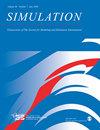一种基于逻辑的事件控制器,用于仿真环境中的目的-目的推理
IF 2
4区 工程技术
Q4 COMPUTER SCIENCE, INTERDISCIPLINARY APPLICATIONS
Simulation-Transactions of the Society for Modeling and Simulation International
Pub Date : 2023-03-24
DOI:10.1177/00375497231157384
引用次数: 0
摘要
模拟游戏的设计是为了培养专业知识和练习特定的技能。为了产生纵向效果,必须精心设计事件序列以产生预期的学习结果,有时需要关注特别困难的情况并重复播放变量。本文开发了一种基于逻辑的方法,用于编码动作、事件和对象之间的相互关系,从而允许在游戏开发环境中立即执行所产生的场景描述。这具有将场景描述与仿真平台本身解耦的双重效果,以及支持学习内容的迭代和灵活开发。为此,我们提供了三个相互关联的组件:首先,我们开发了一个基于答案集编程的场景描述语言。该语言旨在允许自动推理器推断出在给定模拟环境中所采取的操作所导致的未来事件的时间表。其次,我们定义了一个协议,分别在模拟环境和外部自动推理器之间交换动作和计算的期货。最后,作为概念验证,我们为Unity实时开发平台开发了一个应用程序编程接口(API),该接口实现了协议,并提供了一个将计算的未来事件与具体游戏对象连接起来的软件框架。这使得游戏能够从规范中连贯地发展。我们认为,由此产生的系统从其声明性基础继承了人工常识推理的能力,这对于推理不断发展的紧急事件或训练场景很有用。本文章由计算机程序翻译,如有差异,请以英文原文为准。
A logic-based event controller for means-end reasoning in simulation environments
Simulation games are designed to cultivate expertise and rehearse particular skill sets. To yield longitudinal effects, sequences of events must be crafted to yield intended learning outcomes, sometimes by focusing on particularly difficult situations and replaying variants. The present paper develops a logic-based approach for encoding the interrelation between action, events, and objects in a manner that allows the resulting scenario description to immediately be executed in a game development environment. This has the dual effect of decoupling the description of a scenario from the simulation platform itself, as well as supporting iterative and flexible development of learning content. To this end, we provide three interrelated components: First, we develop a scenario description language based on Answer Set Programming. The language is designed to allow an automated reasoner to deduce a schedule of the future events that are caused by an action taken in a given simulation environment. Second, we define a protocol for exchanging actions and computed futures between, respectively, the simulation environment and the external automated reasoner. Finally, as a proof of concept, we develop an Application Programming Interface (API) for the Unity Real-Time Development Platform that implements the protocol and offers a software framework for connecting the computed future events to concrete game objects. This allows the game to evolve coherently from the specification. We argue that the resulting system inherits capabilities for artificial commonsense reasoning from its declarative basis which are useful for reasoning about an evolving emergency incident or training scenario.
求助全文
通过发布文献求助,成功后即可免费获取论文全文。
去求助
来源期刊
CiteScore
3.50
自引率
31.20%
发文量
60
审稿时长
3 months
期刊介绍:
SIMULATION is a peer-reviewed journal, which covers subjects including the modelling and simulation of: computer networking and communications, high performance computers, real-time systems, mobile and intelligent agents, simulation software, and language design, system engineering and design, aerospace, traffic systems, microelectronics, robotics, mechatronics, and air traffic and chemistry, physics, biology, medicine, biomedicine, sociology, and cognition.

 求助内容:
求助内容: 应助结果提醒方式:
应助结果提醒方式:


